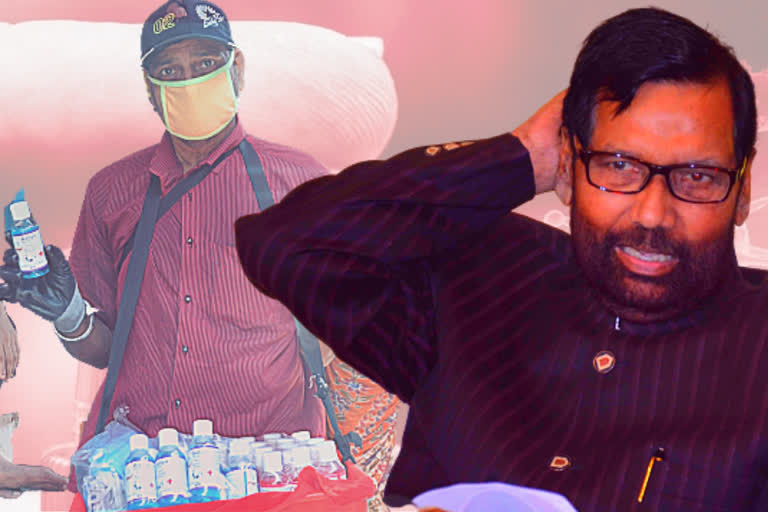New Delhi: Life has come a full circle for NDA ally Ram Vilas Paswan in less than four months as his ministry quietly removed the two most essential items in the country’s fight against the coronavirus, face masks and sanitizers, from the list of essential commodities early this month. The decision comes at a time when the country is witnessing the sharpest rise in COVID-19 infections as the country added more than 2 lakh confirmed COVID-19 cases in the last 10 days alone.
On March 20, Consumer Affairs Minister Ram Vilas Paswan had proudly announced on his Twitter handle his ministry’s decision to cap the price of sanitizers and facemasks when there were just 194 confirmed cases and 4 deaths from Coronavirus in the country. A day after the tweet, his ministry issued the formal order capping the price of not only facemasks and sanitizers but also included the melt-blown non-woven fabric used in the manufacturing of facemasks in the list of essential commodities.
In March, the ministry capped the maximum price of a two-ply mask at Rs 8 and Rs 10 for a three-ply mask, while the retail price of a 100-millilitre bottle of sanitizer was capped at Rs 50.
Read: Face masks, hand sanitisers no more under Essential Commodities Act: Govt
His ministry’s decision to overturn the crucial order early this month, when the death toll crossed the mark of 20,000 and the number of confirmed cases crossed the mark of over 6,05,000 cases, has surprised many.
“Non-continuation of these items under the Essential Commodities Act has lifted the price caps that had been imposed,” said Malini Aisola, co-convenor of the India Drug Action Network (AIDAN), an activist group that works towards increasing the access of medicines to people.
“The caps were critical as a precaution & deterrent against profiteering,” she told ETV Bharat.
Consumer Affairs Ministry’s earlier decision was widely appreciated as these two items are most critical in any country’s fight against the deadly virus that has killed over 22,000 people in the country and more than 5,63,000 people in the world. While wearing facemask is essential for preventing the airborne transmission of the virus, regular sanitization of hands prevents surface transmission.
Under the Epidemic Diseases Act of 1897, several states have made it mandatory to wear masks in public places and levy fine for violation of the order.
The decision to cap the maximum retail price of these two items had also dented the opposition’s charge as Congress leader Rahul Gandhi was demanding GST waiver for these two and certain other essential items under his GST Free Corona campaign. A move questioned by tax experts as the prices of these commodities were fixed regardless of GST rate applicable to them.
Consumer Affairs ministry’s latest order to reverse its own decision to cap the price of facemask and sanitizers has provided enough ammunition to the opposition to immediately target Prime Minister Narendra Modi’s government as it will lead to profiteering during the time of the pandemic.
Activists suggest the National Pharmaceuticals Pricing Authority (NPPA), that regulates the prices of essential medicines, should include facemasks and sanitizers under the Drug Price Control Order. However, the NPPA has not done that following the removal of these items from the list of essential commodities early this month.
“Lifting of the regulations could cause price fluctuations again. NPPA has not taken any action to cap prices under the DPCO,” said Malini Aisola.
While recommending the removal of these two items from the list of essential commodities on July 1, the department of consumer affairs said that as on that date there was no adverse report from states and union territories in respect to the price or availability of these two items that may warrant their continuation in the list of essential commodities.
Due process must to declare sanitary pads as essential item: Health Ministry
However, according to a survey conducted by LocalCircles, a community-networking platform, at the end of May this year, a large number of participants said they faced problems with regard to availability and price of hand sanitizers and facemasks.
According to the findings of the survey shared by LocalCircles with ETV Bharat, half of over 8,000 participants were not able to buy hand sanitizers in the last week of May. And only a quarter of over 7,000 participants were able to buy them at the government-mandated price and nearly three-fourth paid more than the price fixed by the government.
“Per LocalCircles survey, consumers paid more than the Government-mandated price for sanitizers even at the end of May,” said Sachin Taparia, Founder and Chairman of LocalCircles, the platform, which tracked availability of essentials during the lockdown.
“It would have been better had they continued to be in Essential Commodities,” Sachin Taparia told ETV Bharat.
Activists also express concern over the removal of raw material from the list of essential commodities as it will lead to hardening of the prices of two-ply, three-ply and N-95 masks.
The order issued by the ministry of consumer affairs in March also included melt-blown non-woven fabric, which is used in the manufacturing of masks, in the list of essential commodities. Though the ministry’s July order is silent on the removal of melt-blown fabrics from the list of essential commodities the earlier order which included it in the list of essential commodities expired on June 30, effectively removing it from the list.
“The price of melt-blown non-woven fabric, used in 2-ply, 3-ply and N95 masks was being controlled. The costs of the fabric had really escalated after the pandemic,” said Malini Aisola of AIDAN.



